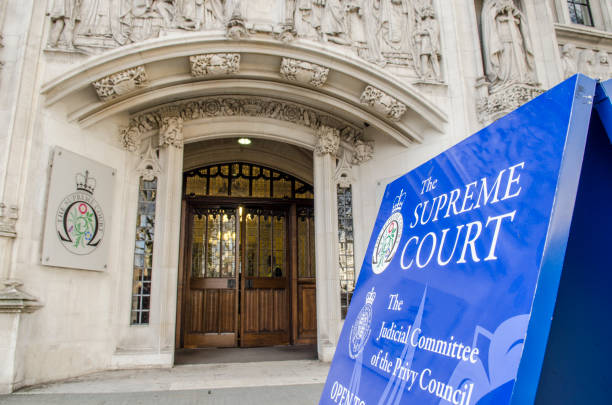Insights | 28 July 2023
UK Supreme Court: what happens next for third-party funding

On 26 July 2023, the UK Supreme Court delivered its judgment in R (PACCAR) v Competition Appeal Tribunal [2023] UKSC 28, in which it held that litigation funding agreements granting funders a percentage of the claim proceeds are “damages-based agreements” within the meaning of UK legislation. Unless those litigation funding agreements comply with the formal requirements for damages-based agreements – and it is thought the majority of existing agreements on the market do not – those agreements will therefore be unenforceable.
The UK Supreme Court’s judgment runs contrary to the previous, generally held understanding – shared by the lower courts in the same case, the majority of the funding industry, and the Ministry of Justice – that litigation funding agreements were not subject to the regulations applicable to “damages-based agreements”. Disputes may now arise between funded claimants and their funders, particularly where successful claimants have (or would have) paid substantial sums to funders under agreements that are now revealed to be unenforceable.
However, notwithstanding some headlines in the legal press, the judgment does not spell the end for the UK litigation funding market. The judgment, while undoubtedly creating difficulties for funders, does not signal a policy shift against third-party funding in the UK. Rather, the priority for funders now is to adapt their funding models and redraft their litigation funding agreements to comply with applicable regulation, including in ongoing cases.
1. DAMAGES-BASED AGREEMENTS (DBAs) IN ENGLISH LAW
Despite English common law’s historic hostility to funding litigation, or sharing in its proceeds, the attitude to third-party funding has softened significantly over the past 30 years. Courts and successive governments have increasingly recognised the role of third-party funding in fostering 2 access to justice, while litigation funding has grown into a substantial industry within the UK.
During the same period, Parliament has legislated to allow providers of litigation or advocacy services to enter into success fee arrangements, which were previously considered unenforceable at common law. These include, notably, damages-based agreements (“DBAs”), where the representative works on a contingency basis in exchange for a share of any damages awarded or recovered.
DBAs are subject to statutory regulation in the form of section 58AA of the Courts and Legal Services 1990 (the “CLSA”), which was added to the CLSA in 2009, and the Damages-Based Agreements Regulations 2013 (the “DBA Regulations”). Those provisions set out several requirements, including that –
- the maximum payment, including VAT, may not be above 50% of the sums ultimately recovered by the client (25% in employment cases) in any proceedings at first instance; and
- the agreement must set out, inter alia, the reason for setting the amount of the payment at the level agreed.
DBAs which fail to comply with these requirements are unenforceable.
Although the DBA Regulations were principally aimed at lawyers and claims management companies, the issue was left open whether litigation funding agreements – in which the funder provides non-recourse financing in exchange for a proportion of the proceeds, or a multiple of expenditure, or both – might also fall within the definition of a DBA. Although the general view shared by much of the industry was that litigation funding agreements were not DBAs, the UK Supreme Court has now ruled differently.
2. SUPREME COURT: LITIGATION FUNDING AGREEMENTS ARE (AND ALWAYS HAVE BEEN) DBAS
In its judgment in R (PACCAR) v Competition Appeal Tribunal [2023] UKSC 28, a four-to-one majority of the UK Supreme Court ruled that, by providing financing, litigation funders provided “claims management services”, as defined by section 58AA(7) of the CLSA and section 419A 3 of the Financial Services and Markets Act 2000. This is the case even where the litigation funders have no management function in respect of the underlying claims.
Since, in the majority’s view, third-party funders provide “claims management services”, most litigation funding agreements whereby the funder took a share of damages fall within the definition of DBAs under section 58AA of the CLSA. They must therefore comply with the DBA Regulations; litigation funding agreements which do not comply will be unenforceable.
The majority reversed the prior decisions of the Competition Appeal Tribunal at first instance and the Divisional Court on appeal, in which both had found that the litigation funding agreements in question were not DBAs. Lady Rose issued a dissenting judgment, in which she considered that third-party litigation funding was never intended to fall under the definition of “claims management services”.
3. PRACTICAL IMPLICATIONS OF THE PACCAR JUDGMENT
The immediate consequence for the respondents (who are claimants in proceedings before the Competition Appeal Tribunal) is that their litigation funding agreements are unenforceable. The judgment also means that litigation funding agreements whereby the third-party funder takes a share of the damages cannot be used in opt-out collective competition proceedings, as section 47C(8) of the Competition Act 1998 makes DBAs unenforceable in those proceedings.
There are also more far-reaching implications. As the law now stands, all litigation funding agreements whereby the funder’s return is determined by reference to the claimant’s recovery are DBAs. This means funders or parties entering into these arrangements will need to comply with the DBA Regulations, as explained above. Alternatively, funders may offer funding only on the basis that they receive a multiple of the amount funded, instead of a share of the damages, since such arrangements are less likely to be caught as DBAs.
However, many existing litigation funding agreements, as the Supreme Court acknowledged, will now be unenforceable. In ongoing proceedings, claimants and funders will often have a mutual interest in restructuring the agreements to be enforceable. Indeed, the funded parties in PACCAR have already indicated their intention to amend their own funding agreement, allowing their claim to continue. In other cases, however, the funded party may object to making payment under the (unenforceable) litigation funding agreement, leading to disputes between funders and funded parties.
The funding industry may also urge the government to amend the DBA Regulations, or the definition of DBAs in the CLSA, to carve out litigation funding agreements from the statutory regime for DBAs. Already in 2015, the Civil Justice Council – despite considering it “extremely unlikely” that the DBA Regulations would apply to third-party funders – recommended that litigation funding agreements be expressly exempted from the requirements for DBAs. Following the judgment in PACCAR, calls for a carve-out for litigation funding agreements from the DBA regime are likely to grow stronger.
4. WILL FUNDERS NOW LOOK TO OTHER JURISDICTIONS?
The Supreme Court’s judgment has generally been poorly received by the litigation funding industry. In a joint statement, the Association of Litigation Funders and the International Legal Finance Association described themselves as “disappointed by this decision as it runs contrary to the accepted understanding that financing agreements are not damages based agreements”. Although funders have stated that they will review the structure of their arrangements to comply with applicable regulation, the judgment raises the possibility that the UK will become a less attractive market for litigation funding.
Whereas many litigation funding agreements must now comply with the regime for DBAs in the UK, other jurisdictions have recently taken a more liberal approach to third-party funding. Since 2017, for example, Hong Kong and Singapore have permitted third-party funding in arbitration and some court proceedings. On 5 July 2023, the Irish legislature enacted new 5 laws which will permit third-party funding in international commercial arbitration in Ireland.
Meanwhile, in the EU, the European Commission appears to have postponed its decision on whether to adopt the European Parliament’s proposals on regulating the third-party funding sector, announcing that it will first publish a mapping study of the sector in Europe. The development follows a report by the International Legal Finance Association criticising proposals for a cap on funders’ recovery and mandatory disclosure of thirdparty funding. It is hoped that the Commission’s indication that it wishes to study third-party funding further means that any future regulation in this area will be well considered.
Nevertheless, the judgment in PACCAR should not be interpreted as a policy shift in the UK. To the contrary, the Supreme Court took care to note that litigation funding “is widely acknowledged to play a valuable role in furthering access to justice.” There is currently no proposal by the UK government or Parliament to subject third-party funding to further regulation. If not reversed by primary or secondary legislation, the immediate consequences of the Supreme Court’s decision will be unfortunate for many, but funders should be able to draft future litigation funding agreements to comply with the statutory framework for DBAs.
For further questions or comments about this topic, please contact the authors.
Back to listing



